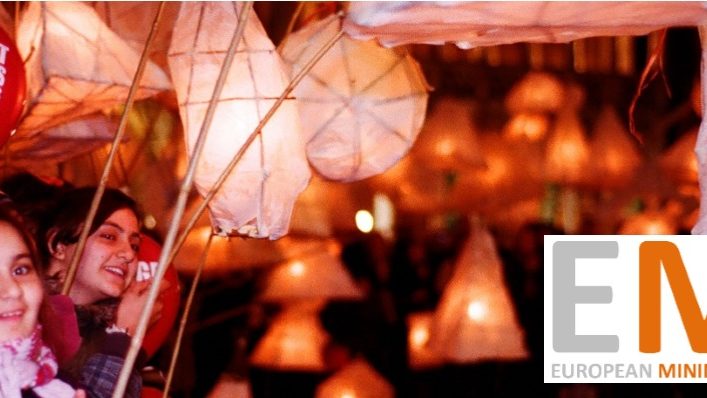-
Hiring of the 3rd Director:
Barbara Helffrich (Germany) and she will stay as Director for three years (2013-2016)
-
EMIN Project:
The EMIN was a two-year project (2013-2014) funded by the European Commission, in line with the European Commission’s Active Inclusion Recommendation of 2008, the Europe 2020 Strategy and in the context of the European Platform against Poverty and Social Exclusion. The main direct partners involved were:
- AGE Platform Europe
- FEANTSAEuropean Federation of National Organisations Working with the Homeless
- Belgian Public Administration Planning Service Social Integration, Anti-Poverty Policy and Social Economy Social Integration
- ANSA Agence Nouvelle des Solidarités Actives
- ETUI European Trade Union Institute
- OSE Observatoire social européen
- SIRG Social Inclusion Regional Group
- National Minimum Income Networks (NMIN) in 5 countries led in Belgium by theBelgian Anti-Poverty Network, in Italy by CILAP/EAPN Italy, in Ireland by EAPN Ireland, in Denmark by EAPN Denmark, and in Hungary by EAPN Hungary.
In the second year of the project all EAPN Networks would be involved.
-
Cut in EAPN’s budget by the EC:
In 2013 EAPN and all the other NGO’s funded by the EC under the EaSI program) were confronted with huge cuts in the funding (around 30% overall). No matter the arguments and discussions with the EC responsibles the decision was taken with an important impact in terms of the staff size (several people hade to be dismissed) and activities. Besides the financial cut, there was also an understating that the work developed by EAPN should pick-up the logic of a project with very concrete deliverables and products. This was against the nature of EAPN and also of the understating of those who founded it, which believed, that EAPN was an important partner of the EU project, particularly for promoting the active participation of the citizens living in poverty. At that time, and also because there was a big delay in signing the contract, with huge constraints in terms of cash flow and payment of salaries, an emergency meeting was asked with President Barroso. That meeting took place (with the participation of Bureau members and people experiencing poverty) and the importance of EAPN as a partner of EC was underlined by the President. He affirmed that under no circumstances the EC would reduce the interest in the work of the organisation, seen as a crucial partner in the fight against poverty in the EU. However in terms of cuts, the only alternative of the EC to reduce the impact was to grant EAPN with a specific project for monitoring the Semester: “EU Semester Alliance.” There was a promise that this project would stand until the Semester approach existed, but in 2014 the EC changed again opinion and EAPN faced new difficulties in terms of budget reduction.
-
Attribution of the First prizes from the EAPN Fund:
-
EAPN Semester Alliance Project:
EAPN has coordinated the EU Alliance for a democratic, social and sustainable European Semester (EU Semester Alliance), a broad coalition bringing together 15 major European civil-society organisations and trade unions, representing thousands of member organisations on the ground at European, national and local levels in the European Union and 3 national pilot alliances. The ‘EU Semester Alliance’ aims to support progress towards a more democratic, social and sustainable Europe 2020 Strategy, through strengthening civil dialogue engagement in the European Semester at national and EU levels.
-
Enrolment of Latvia & Croatia in EAPN:
EAPN counts 31 National Networks
-
Partnership Principle adopted in Structural Funds:
In the legislative framework for the 2014-2020 ESI Funds the partnership principle has been strengthened. Article 5 of the Common Provision Regulation (CPR) makes it compulsory for each ESI Fund programme to organise a partnership at all programming stages and at all levels. A European Code of Conduct on Partnership (CoC) has been set up to support Member States to ensure that all partners are involved at all stages in the implementation of Partnership Agreements and programmes. Even though the partnership principle is not new for the 2014-2020 ESI Funds, more importance has been given to stakeholder involvement and influence.
-
12th European Meeting of People Experiencing Poverty:
“What can we learn from the experiences of poverty today?” The 12th European Meeting of People experiencing poverty was held from 18-20 June on the Esplanade of the European Parliament, with delegations from 26 European countries.
-
25th GA – Belgrade (Serbia)
-
Approval of FEAD:
Although involved in quite a big polemic and a difficult consensual decision in the Council, the Fund for European Aid to the Most Deprived (FEAD) supports EU countries’ actions to provide food and/or basic material assistance to the most deprived. This includes food, clothing and other essential items for personal use, e.g. shoes, soap and shampoo. The good new for EAPN demands was that material assistance needed to go hand in hand with social inclusion measures, such as guidance and support to help people out of poverty. National authorities may also support non-material assistance to the most deprived people, to help them integrate better into society. FEAD support will help people take their first steps out of poverty and social exclusion. The bad new has the “encrypted” demand on activation as a pre-condition for accessing the fund, meaning that FEAD will help the most deprived people by addressing their most basic needs, which is a precondition for them to be able to get a job or follow a training course such as those supported by the European Social Fund (ESF). In real terms, over €3.8 billion are earmarked for the FEAD for the 2014-2020 period. In addition, EU countries are to contribute at least 15% in national co-financing to their national programme. EAPN and some national members have been actively involved in the monitoring and follow-up of this program.



